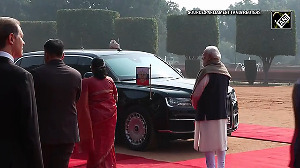General Stanley McChrystal, the North Atlantic Treaty Organisation commander in Afghanistan, arrived in Kabul in the early months of the Barack Obama administration roaring like a tiger. He disappeared like a snake's tail slithering away, on Thursday, when Obama replaced him with General David Petraeus, the present head of the US Central Command.
Obama had been justifiably angered by McChrystal's irreverent remarks which appeared in Rolling Stone magazine. His remarks caused considerable embarrassment in the Pentagon and the White House. His dismissal was inevitable.
Even before the sacked general landed himself in an inexcusable position due to his irreverence amounting to insubordination, the halo with which he had taken over the NATO command in Afghanistan last year had disappeared because of his failure to come up with a strategy which could enable his troops to prevail over the Taliban. Since McChrystal took over in Kabul last year, the Afghan Taliban's operations, from sanctuaries in Pakistani territory, had increased in daring and success.
Obama's hopes of the beginning of an exit from Afghanistan from the middle of 2011 are in the process of being belied due to McChrystal's failure to work out an effective strategy against the Taliban and its Pakistani mentors.
What worked for McChrystal during his previous posting in Iraq -- his skills in special operations and his ability to divide and prevail over the Al Qaeda and its Baathist allies from Saddam Hussein's disbanded army -- did not work in Afghanistan.
The Taliban in Afghanistan is a united force, which has successfully resisted US-inspired attempts to create a split between the so-called good and bad Taliban. In Iraq, the Al Qaeda with its Saudi volunteers was in the forefront of the battles. It was easy to create a divide between the outsiders in the Al Qaeda and the native Iraqis, who hated the Saudis as much as they hated the Americans. They were prepared to temporarily swallow their dislike of the Americans and collaborate with them against the outsiders.
In Afghanistan, the native Pashtuns of the Taliban have been in the forefront of the battles against the NATO forces. The role of Al Qaeda outsiders in the battles waged by the Taliban against the NATO forces has been minimal. Conditions for a successful divide and prevail strategy did not exist in Afghanistan and does not exist even today.
Moreover, in Iraq, the role of Iran, despite its aversion to the US, was beneficial to the US operations against the Al Qaeda and its associates. In Afghanistan, the role of Pakistan, while seemingly beneficial, has really been detrimental to US war efforts.
In Afghanistan, a different mix was required -- better conventional capabilities in Afghan territory, better covert capabilities in Pakistani territory to target the Taliban sanctuaries and the political will to force Pakistan to stop playing strategic games in Afghanistan. Instead of devising such a strategy, McChrystal followed a strategy largely based on illusions -- illusions of a coming split in the Taliban, illusions of a diminution of public support for the Taliban and illusions of Pakistani co-operation in dealing with the Taliban.
These illusions proved to be his undoing. His reported decision to postpone the much-trumpeted offensive against the Taliban in the Kandahar area scheduled for later this year spoke volumes of his failure to come to grips with the situation on the ground. McChrystal minus the acquired-in-Iraq halo committed the sin of speaking disparagingly of his political and professional superiors and has paid the price for it. His irreverence enabled Obama to rid himself of a general on the brink of battle failure on the grounds of misconduct instead of on the grounds of failure which could have reflected badly on Obama's political and professional judgment.
It was easy to get rid of McChrystal. It is going to be difficult to turn the tide of the war in favour of NATO. Petraeus, whom Obama has chosen for this purpose, had also acquired a halo in Iraq. The halo has become dimmer since he took over as the commander of the central command. As commander, he has to share the responsibility for the set-backs in Afghanistan and for the failure to make headway against the Taliban.
As General Petraeus gets going in his new assignment, he will have to accept the fact that Afghanistan is not like Iraq, that the Pashtuns are not like the Iraqis or the Saudis, the Taliban is not like the Al Qaeda or Saddam's Baathists, and that Pakistan is not like Iran. He will have a new set of foes unlike any he had known and encountered in Iraq. In Sunni-majority Pakistan, he will have an Islamic state more devious and dissimulating than a Shia-ruled Iran.
Petraeus will need a new strategy which will weld together the Pashtuns loyal to Afghan President Hamid Karzai and the Tajiks and other non-Pashtuns loyal to the leaders of the old Northern Alliance. India understands the mindset of a Pakistani Sunni better than many other countries in the world. Petraeus will benefit with a share of Indian wisdom.






